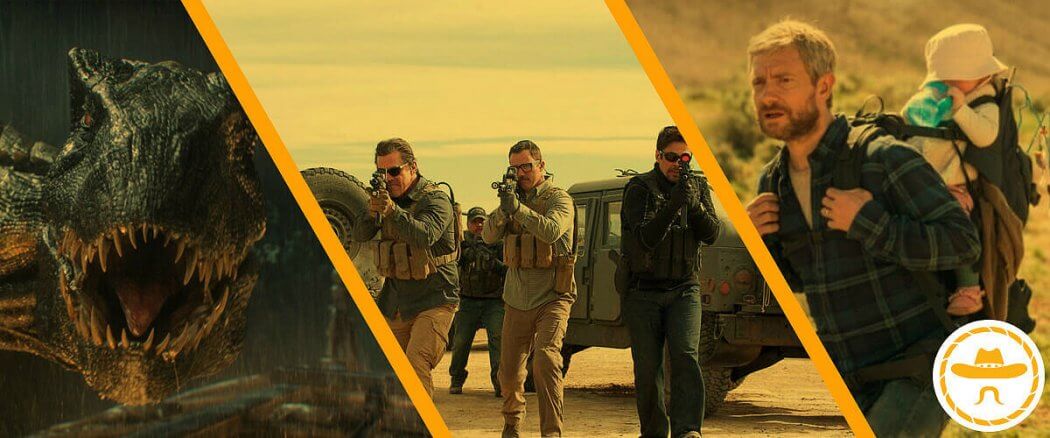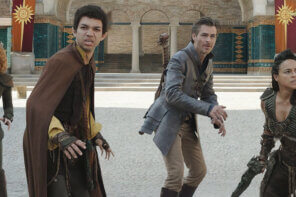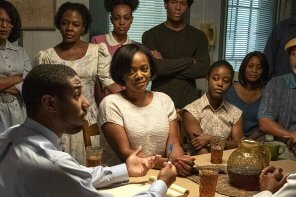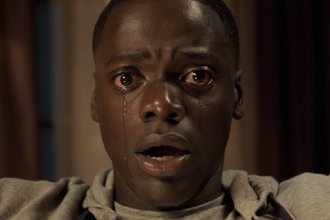Welcome to another edition of Mini-Review Roundup where we present smaller reviews of several movies at once. Up this time: Cargo, Jurassic World: Fallen Kingdom, and Sicario: Day of the Soldado.
Cargo
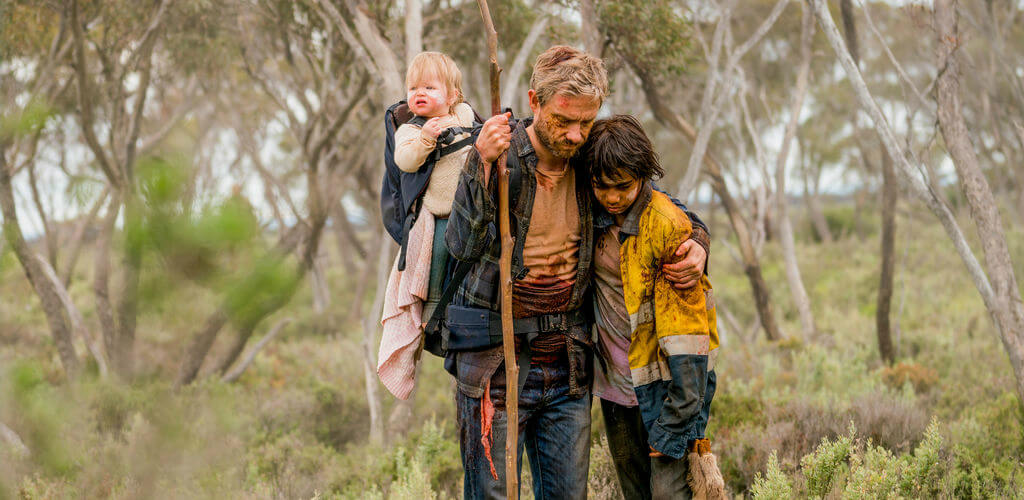
The zombie genre has just about come and gone in this era of prestige television and volatile blockbusters. The Walking Dead, once the standard-bearer for all zombie-related intellectual property, is losing its creators and stars, and fresh ideas like Shaun of the Dead or Warm Bodies are being lost to TV, where high-concept fare like iZombie is allowed to run free with endless platform and creative options.
So leave it to Netflix, the king of streaming, to put out Cargo, a brand new spin on the age old zombie structure: what if our protagonist was already doomed to become a zombie? What would they do with the time they have left? And how would the knowledge of their impending doom reflect on their surroundings and short-lived humanity? Directing team Yolanda Ramke and Ben Howling — Ramke also penned the script — craft an effective, tense thriller off of this concept, one that feels revolutionary after so many creatives spun the wheels on flawed heroes doing their best to avoid death-by-undead.
Martin Freeman stars as Andy, a father who is surviving his hostile new surroundings along an Australian river with his wife and their young daughter when tragedy strikes his unsuspecting family. Freeman is a solid casting choice for this sort of grounded fable. He’s most effective in the story’s quieter moments, as Andy sees the world around him fading into oblivion. He’s often forced to confront Darwinian adjacent questions of survival-of-the-fittest, only subtracting himself from the equation. These often lead to moments of melancholic reflection and don’t dwell too long because of the time-sensitive nature of the story. But the lessons are documented and add up to a climax that feels earned and emotionally satisfying despite its unintentionally comic execution.
The real star of the whole project is Ramke, who also wrote and directed a short-film of the same name and concept back in 2013. Her script is light on its feet for what can be a pretty dense movie, and her direction, while still inconsistent in nature, feels like surprisingly thorough in approach. While the concept of, “What does our humanity look like when we’re forced to confront our mortality?” isn’t exactly new for film or the genre at hand, Ramke’s take feels fresh and timely, questioning the nature of both racism and barbarism in a setting where social justice would seem like the least of anyone’s concerns. Cargo presents us with a hard truth, one that goes beyond ourselves and into the universal realm, asking us how relative our morals can be in any given scenario.
So while Cargo falls victim to some amateur tropes — moments of excessive gore and some weakly-served subplots subtract from an otherwise tight narrative — it still manages to cement itself as an standout piece in an overserved genre. Even more so, it establishes Ramke as an exciting young filmmaker to watch, a creative mind whose sound writing and directing chops will take her well beyond the corpses of zombie IP Hollywood is leaving in its wake.
Grade: B
Jurassic World: Fallen Kingdom
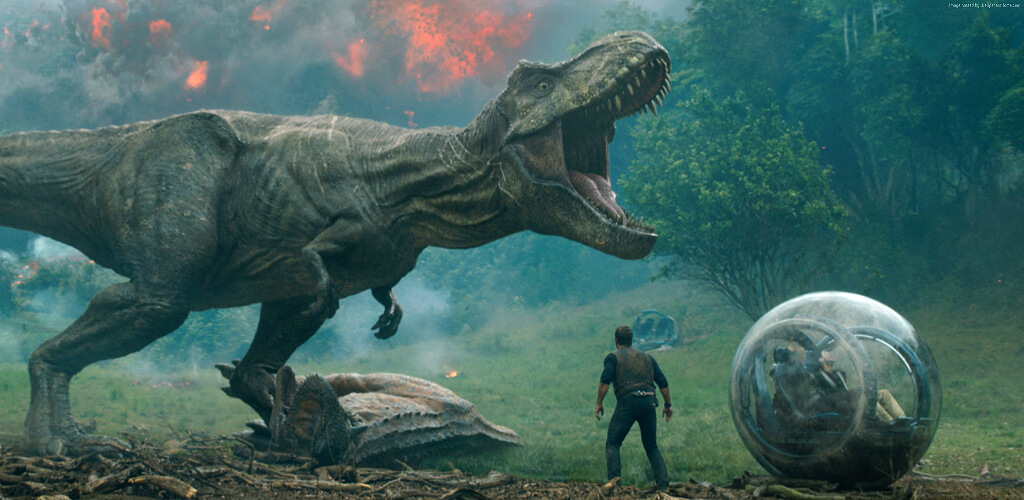
It’s been 25 years since Jurassic Park hit theaters, and it’s since been upheld as the ideal blockbuster. From the mysterious rollout of the trailers to the near-perfect execution of the filmmaking itself, Steven Spielberg’s summer hit holds up as the standard for all creature features that follow in its giant footprints.
It’s a shame the stories in its own universe don’t hold up to that standard. Even among the most generous circles, the Jurassic Park franchise has been a critical disaster. The 2015 franchise reboot, Jurassic World, didn’t succeed in shedding the franchise’s flaws, but instead sought to lean into the absurdity that Spielberg’s 1993 megahit avoided. It’s own sequel, Jurassic World: Fallen Kingdom, does much of the same, except this time it doesn’t feel intentional.
Written by Colin Trevorrow and directed by Spanish filmmaker J.A. Bayona, Fallen Kingdom stinks of a sharp turn toward sincerity from a franchise that long lost its social, if not its capital, relevance. Chris Pratt and Bryce Dallas Howard are back to spearhead the bill, and Pratt feels like the only one who’s worth sticking around for, if only because of his base-level charm. Howard is even more of a caricature than her high-heel-running executive, taking every opportunity to over or under act the hilariously overwrought lines she’s been given. To round it out, Justice Smith and Daniella Pineda are brought on to justify Fallen Kingdom’s performatively “woke” credentials, at one point even having a character exclaim, out loud, that Pineda is “a nasty woman.”
What’s worse than Fallen Kingdom’s barely thought out parts, though, is its confused and muddled politics. A strong undercurrent of environmental stewardship runs through the film, and these lead to moments of surprisingly earned grief. These moments ramp up the panache, giving us the best parts of Jurassic World with the network of ideas started in Jurassic Park. Bigger ideas of scientific responsibility are mixed with themes of redemption and purpose, and how we as humans can identify our flaws and seek to make penance for them. There’s even a sense that we can’t, and maybe we need something more powerful than ourselves to do so. But these flourishes are undercut by half-baked emotionalism based in underdeveloped side plots and reliance on characters we haven’t seen in decades or even knew existed in the first place.
And so the newest Jurassic Park entry becomes a soulless slog, a sermon that is both preachy and bombastic. Bayona keeps it from being a complete disaster with his few bursts of inspiration. But even he can’t stop Fallen Kingdom from feeling like a new low for a franchise whose DNA has been almost irreparably tainted from the nearly spotless source that emerged a quarter of a century ago.
Grade: D+
Sicario: Day of the Soldado
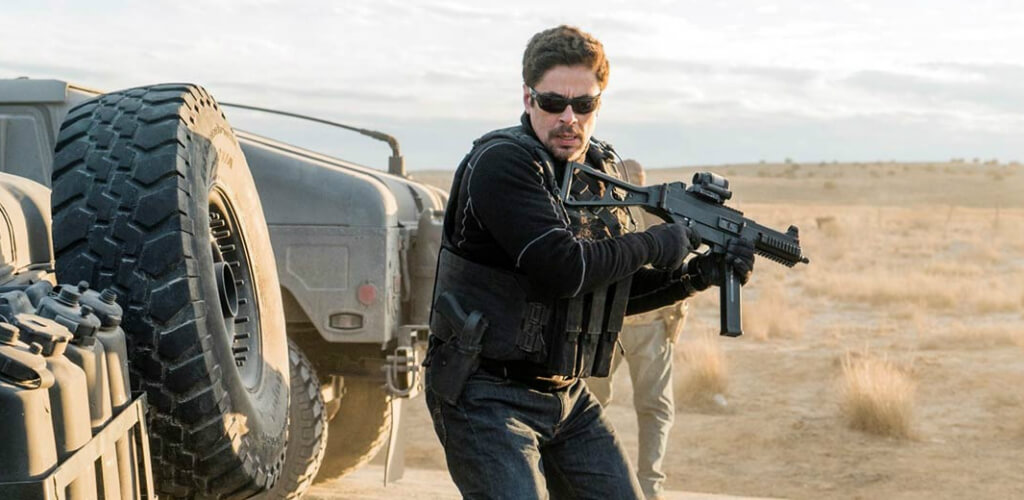
There can only be so many times the words “In an age of movie franchises” or “Amongst an endless bounty of cinematic universes” can grace the beginning of a film column or review. Because in this age of cinematic universes (indulge me for a second), no sequel comes as much of a surprise anymore. Any film that outshines its box office analytics will be pushed into future development as Hollywood types continue to seek funding for their pet projects.
Still, news of 2015’s drug-thriller Sicario getting a sequel was met with optimistic cynicism. An underrated hit that launched Dennis Villeneuve’s career into the next stratosphere, Sicario didn’t seem like the type of film that would spawn a successor. It’s financial gains were modest and its thematic material didn’t exactly work as a all-demographics-welcome sign. But for the first time in a long time, a seemingly one-off success story made the leap into something more significant, making it an exercise worth investing in (for some fans).
So even before the lights fade, Sicario: Day of the Soldado’s is a win for ingenuity in Hollywood. And after the lights fade back in, it can be seen even more favorably. Soldado is a triumphant return to the big screen for the unexpected Sicario franchise, a film that doubles down on the hard action and political ambiguity of the first while touching on new threads its predecessor only hinted at.
While Villeneuve and moral compass Emily Blunt are out, Josh Brolin and Benecio Del Toro are back as Matt Graver and Alejandro Gillick, a tag team of black ops agents who are once again sent to fight Cartel activity along the border. This time, however, all notions of patriotic heroism are left at the table as the U.S. orders the kidnapping of a Cartel mob boss’s daughter.
Much like Sicario, Soldado’s creators don’t find it too necessary to hold the viewers’ hands throughout the film. Instead, we’re made to confront the atrocities (and back-biting) that dominate the U.S. – Mexico border crisis. The lack of a central compelling character (Blunt) almost acts as the loosing of an essential screw, leaving the film’s universe in moral chaos and asking us to pick up the pieces. It’s a bold move, especially when you consider the lack of direction such an exercise could have had. But director Stefano Sollima, who has his roots in crime television, keeps his audience reeling with an array of knockout moments that force us into a ideological corner. We find ourselves asking questions of ourselves instead of the film. Why do I root for this character? How do I feel about their actions and choices? What would I do in that same situation, if my life was in the balance? These are questions that lead to meditation and self-reflection, forcing us to confront the ways they we acts as hearers and not doers of the truths we seek in this life.
This sort of filmmaking is undoubtedly controversial given our current national climate, but is a necessary function of Hollywood filmmaking. Sollima’s presence gives us an objective outsider’s view, trusting that we’re ready to handle the questions he hands us while subtly giving us even more than we realized we could handle. Not only that, but it’s a thrilling victory for film in a day when franchises like Marvel, Star Wars, and Jurassic Park find themselves as creatively confused and conflicted as they’ve ever been.
Grade: B+

